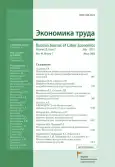Training infrastructure model for creative industries
- Authors: Trufanov D.O.1,2, Voroshilov V.A.3, Borisyuk L.A.4, Malakhovskaya A.M.5, Cherepanova A.A.1, Silviyaynen D.S.1
-
Affiliations:
- Regional State Budgetary Institution of Additional Vocational Education Center for the Development of Vocational Education
- Siberian Federal University
- Krasnoyarsk College of Creative Industries
- St Petersburg State University
- Siberian Federal University, Institute of Business Process Management and Economics
- Issue: Vol 10, No 7 (2023)
- Pages: 1061-1078
- Section: Articles
- URL: https://journals.eco-vector.com/2410-1613/article/view/607838
- DOI: https://doi.org/10.18334/et.10.7.118661
- ID: 607838
Cite item
Abstract
About the authors
Dmitriy Olegovich Trufanov
Regional State Budgetary Institution of Additional Vocational Education Center for the Development of Vocational Education; Siberian Federal University
Email: dtrufanov@sfu-kras.ru
Vladimir Aleksandrovich Voroshilov
Krasnoyarsk College of Creative Industries
Email: vladimir.voroshilov@gmail.com
Lidiya Andreevna Borisyuk
St Petersburg State University
Email: lidiaborisyuk@mail.ru
Anna Maksimovna Malakhovskaya
Siberian Federal University, Institute of Business Process Management and Economics
Email: fvtz8@mail.ru
Anita Aleksandrovna Cherepanova
Regional State Budgetary Institution of Additional Vocational Education Center for the Development of Vocational Education
Email: cherepanova.anita@yandex.ru
Diana Sergeevna Silviyaynen
Regional State Budgetary Institution of Additional Vocational Education Center for the Development of Vocational Education
Email: dianassfu@gmail.com
References
- Абанкина Т.В. Креативная экономика в России: новые тренды // Журнал новой экономической ассоциации. – 2022. – № 2(54). – c. 221-228. – doi: 10.31737/2221-2264-2022-54-2-13.
- Аликперов И.М. Возможности и проблемы подготовки креативных работников для постиндустриальной экономики // Образование и наука. – 2011. – № 6(85). – c. 12-21.
- Бернадская К.В. Модель подготовки кадров для креативного сектора в вузах культуры // Труды Санкт-Петербургского государственного института культуры. – 2023. – № 227. – c. 37-41.
- Бернадская К.В. Модель подготовки кадров для креативных индустрий // Креативные индустрии региона: опыт, перспективы, подготовка кадров: Тезисы докладов всероссийской научно-практической конференции. Санкт-Петербург, 2022. – c. 46-47.
- Васильева Е.В., Коршунов А.В., Останина Е.В. Проблемы проектирования модели развития креативных индустрий в России // Вестник Нижегородского университета им. Н.И. Лобачевского. Серия: Социальные науки. – 2022. – № 3(67). – c. 9-14. – doi: 10.52452/18115942_2022_3_9.
- Имаева Г.Р., Сушко Е.Ю. и др. Вклад цифровых платформ в развитие креативных индустрий и поддержку креативного предпринимательства. - Москва: Издательство НАФИ, 2021. – 84 c.
- Грицких Н.В., Кононова О.Н., Рыбак Н.С. Развитие креативных индустрий в условиях цифровизации // Социология. – 2022. – № 6. – c. 39-47.
- Дербина Ю.С., Кужутова А.Ю., Боркова Е.А. Креативная экономика: развитие в России // Экономика и бизнес: теория и практика. – 2022. – № 5-1. – c. 224-226. – doi: 10.24412/2411-0450-2022-5-1-224-226.
- Каверина Н.А., Гретченко А.И., Гретченко А.А. Современное развитие креативных индустрий в России (опыт столицы и регионов) // Вестник Саратовского государственного социально-экономического университета. – 2019. – № 1(75). – c. 58-64.
- Концепция развития творческих (креативных) индустрий и механизмов осуществления их государственной поддержки в крупных и крупнейших городских агломерациях до 2030 года, утв. Распоряжением Правительства РФ от 20 сентября 2021 г. № 2613-р
- Проект КРЕАТИВНАЯПЛАТФОРМА.РФ – цифровая платформа креативных индустрий. Президентский фонд культурных инициатив. [Электронный ресурс]. URL: https://фондкультурныхинициатив.рф/public/application/item?id=2c1a1db3-c0aa-47c4-81ae-878fea030cdcysclid=lcq4xlfn3931132173.
- Распоряжение Правительства Российской Федерации от 20.09.2021 г.. № 2613-р. Government.ru. [Электронный ресурс]. URL: http://government.ru/docs/all/136723/.
- Симонова И.Ф. Интегративный подход в подготовке специалистов для креативного сектора: стратегии развития // Труды Санкт-Петербургского государственного института культуры. – 2023. – № 227. – c. 13-20.
- Зеленцова Е.В. и др. Творческие (креативные) индустрии. - М., 2022. – 221 c.
- Хестанов Р. Креативные индустрии – модели развития // Социологическое обозрение. – 2018. – № 3. – c. 173-196. – doi: 10.17323/1728-192X-2018-3-173-196.
Supplementary files











